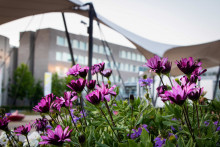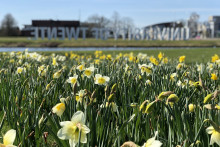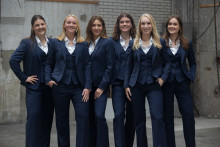Anyone reading the 2025 annual plan will notice a tone of concern about the drastic reduction in both funding and staffing:
‘What remains is a team consisting of a policy officer (26 hours), external communication support (where justified), and a secretary who also serves as a project manager for a few hours a week (10 hours). This leaves just under 1 FTE to keep the sustainability programme running, manage the environmental permit, and handle all communications.’
Yet, SEE policy officer Birgit Dragtstra remains hopeful: ‘We assume this situation is temporary.’
Making choices
Meanwhile, the university’s goals remain as ambitious as ever: a CO₂-neutral, gas-free, and zero-waste campus by 2030. Dragtstra: ‘So we really need to focus on what we can still take on.’
She concentrates on the tasks that are achievable within the available resources. ‘First and foremost, we look at our legal obligations – for example, meeting the conditions of UT’s environmental permit. Fortunately, many colleagues are already actively involved in sustainability on their own initiative, which is great to see.’
The emphasis now lies on advising and encouraging others, rather than carrying out projects in-house. The recent switch to a different waste processing company has brought some relief: ‘They employ their own staff to manage waste-related projects for us, which saves us time.’
Communication
The SEE Annual Plan for 2025 stresses that communication is essential to keep sustainability high on the organisation’s agenda. However, no dedicated communications staff member has yet been assigned from the Marketing & Communication department, the report notes. So Dragtstra tries to handle as much as she can herself.
She gives examples such as a visual explaining the environmental impact of certain sandwiches sold in the canteen or improved signage on the campus bins to help people separate their waste properly. ‘We’ve seen that students have started making different choices because of that.’
Freelancer on a prepaid basis
For a blog series on sustainability and biodiversity, a former employee has been brought in as a freelancer, working on a prepaid hour-based contract. ‘We can use their services for 40 hours a year.’ Once a month, this freelancer interviews biodiversity experts about their work at UT and turns the conversations into stories for the university website.
SustainaBul
A telling sign of the reduced capacity is this year’s result on the SustainaBul list – a ranking by student network Studenten voor Morgen, which assesses how higher education institutions handle sustainability. Last year, UT achieved a respectable 13th place. This year, Twente finished 33rd – at the bottom.
Dragtstra: ‘That’s disappointing but understandable. The assessment has two parts: first, a student panel conducts an audit based on our website; then, they ask whether the university can provide missing information. This second step we consciously chose not to pursue this year due to the changes in our team. Luckily, an external ranking doesn’t reflect the full picture of what we’re actually doing on the ground.’
Dragtstra acknowledges that the situation is far from ideal. ‘But I still hope this is just temporary. Once the university has a bit more breathing space, we’ll be able to expand the programme again.’






